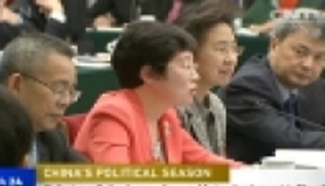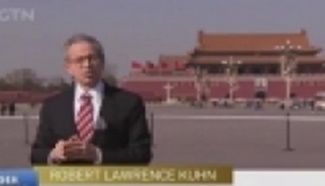XI'AN, March 6 (Xinhua) -- Zheng Yan has told stories about the Terracotta Warriors thousands of times and knows more about the Xi'an icons than many natives of the ancient city, but she is not yet recognized as a permanent resident.
Recently, however, the 29-year-old tour guide, who is applying for household registration permit, or "hukou," saw hope in a new policy.
The hukou is a crucial document entitling residents to social welfare in a given city. The capital of northwest China's Shaanxi Province eased its rules from March 1.
Under the new policy, permanent residency is available to non-natives like Zheng if they are aged 35 or below, are graduates and are willing to work, live or start a business in the city.
Migrants can transform their status from temporary to permanent resident if they meet certain requirements, such as buying property, investing a large sum of money or being identified as "talents" fulfilling certain criteria.
Statistics show that within two days, the Xi'an government answered questions from more than 16,000 non-natives, handling about 3,700 applications.
FREE LABOR MOVEMENT
Zheng graduated from Baoji University of Arts and Sciences in 2011. Attracted by its historical monuments and cultural relics, she became a tour guide in Xi'an, about four hours drive from her home city, Ankang.
But working and owning a house there has not made her feel a real part of the city.
"Permanent Xi'an residents enjoy preferential policies in purchasing vehicles and houses, and even obtaining driving licenses," said Zheng, adding that non-natives have to pay extra fees of 40,000 yuan (around 5,800 U.S. dollars) to 50,000 yuan for children to finish at the local public primary schools.
The household registration system has divided the nation into rural and urban populations since the 1950s. The system makes it difficult for migrants to enjoy equal welfare in cities, such as educational opportunities, employment support and care for senior citizens.
And it has been long criticized for hindering free labor movement, which is essential to building a modern society.
"The new policy eliminated people's worries and is helpful for us to keep talent in the city," said a manager, surnamed Li, from a Xi'an-based biological product company.
The new policy allows the company's chief engineer, 50-year-old man surnamed Liu, to gain permanent residency. Liu started to work for the company in 2015, but his hukou was from his hometown Shijiazhuang, capital of Hebei Province.
"Separation from my hukou always brings me troubles," Liu said. "Once I lost my ID card, and I had to catch a 13-hour train to Shijiazhuang to apply for a new one. I feel closer to the city these days. It is my home now," he added.
CITY DEVELOPMENT
China first decided to reform its household registration system years ago. Challenged by restricted resources, big cities such as Beijing, Shanghai and Guangzhou control their population using a points-based system.
This year Beijing is working out detailed rules for migrants to claim permanent resident permits based on the points system. Applicants must meet several requirements, including having a temporary residence permit and paying social security premiums in the city for at least seven consecutive years.
Under the points system, employment, accommodation, educational background and tax payments will be converted into points. Migrants can transform their household registration status to local residence after reaching a specified number of points.
Lu Weichao, a 33-year-old computer engineer, once considered leaving Beijing for a smaller, less competitive city, but has now changed his mind as the points system enables him to gain a permanent residency.
"Another reason is that big cities can offer me more job opportunities, and my baby girl can get a better education and broader her horizons," Lu said.
"If migrants cannot get equal welfare like permanent residents, they will leave. Some western cities have already witnessed talent shortages, which have hindered their development," said Shi Ying, a researcher with the Shaanxi Academy of Social Sciences.
According to the Ministry of Public Security, China's registered permanent urban residents rose to 41.2 percent of the total population in 2016, after the easing of the household registration policy.
In 2015, only 39.9 percent of the country's population held urban status, and the current urbanization drive is aiming for 45 percent by 2020.
Zhang Baotong, president of the Shaanxi Province Economic and Cultural Research Institute, said that it showed progress.
"The basis of a city's development is talent. Relaxing the residency permits can help attract more talent. On the other hand, young people will have more opportunities entering big cities," Zhang said.
But how do local residents view the household registration reform?
"The growth of the population can increase income for people in the service sector, like me," said Wang Ping, a taxi driver.
However, others were concerned.
"Will the price of real estate rise after more people need houses here?" said Xiang Xiaoli, a college student. "The policy is good, but we should improve our public services such as education and health to meet the demands of a larger population,"
Such concerns were shared also by Zheng Yan.
"Giving non-natives like me an identity is good, but we also hope to live in a city with sustainable development and enough resources," she said.












